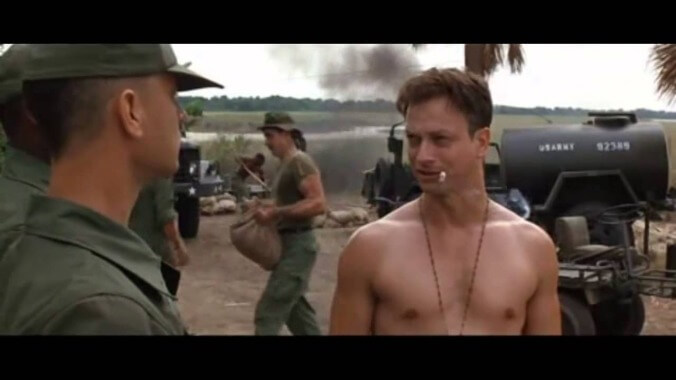Here's an earnest plea to stop using Creedence Clearwater Revival in every damn Vietnam movie

Music makes a good thing better. Would Gwyneth Paltrow walking off a bus be so majestic were it not for Nico? Or would Rahad Jackson’s house be as transcendently warped without Ricky Springfield? And can we all agree that it’s Frou Frou’s fault for making us think Garden State was going to be good? Use an evocative song too much, though, and it inevitably veers into parody. No one takes a thug seriously if he enters to “Bad to the Bone.”
One less-discussed trope in film scoring, however, is the use of pop music in Vietnam war films. Or, should we say, the use of Creedence Clearwater Revival in Vietnam war films. In a new Pitchfork feature, writer Zach Schonfeld gets to the bottom of this tired trope. Beginning with the use of “Green River” in the opening of Steven Spielberg’s The Post, Schonfeld digs into Hollywood’s long, long history of relying on songs like “Fortunate Son” or “Run Through the Jungle” to do the heavy lifting in terms of scene-setting. It starts with 1978's Who’ll Stop the Rain (itself inspired by a Creedence song) and the iconic Apocalypse Now, gets tired by 1989's Born On the Fourth of July, and capsizes with its most famous use in Forrest Gump. CCR has subsequently gone on to become a go-to, a cheap, easy way to evoke a wartime milieu whether the fighting is happening onscreen or off.
There’s a reason for this, though.
[D]uring the ’80s and early ’90s, music supervisors increasingly latched onto Creedence for two underlying reasons: Legally, the music was readily obtainable, because Fogerty had signed away distribution and publishing rights to Fantasy Records (a decision he’d later regret). And culturally, the band’s roots-rock hooks functioned as a nostalgic shorthand, immediately situating scenes in the late ’60s or early ’70s. (Plenty of non-Vietnam-related films set in that era use Creedence songs for this purpose too, including Rudy, My Girl, and Remember the Titans, to name a few.)
Most Creedence songs contain no direct reference to the war (though “Run Through the Jungle” is frequently misinterpreted as such), but they do evoke a period when the war dominated American life. “That was when the band was popular,” says bassist Stu Cook. “Creedence was part of the soundtrack of the time.”
Creedence’s career was a model of speedy efficiency: seven albums in four years. The band recorded at an absurd pace, releasing three LPs in 1969 alone, and disbanded less than five years after adopting the Creedence name. But the brevity of the band’s career seems to have contributed to its longevity as a cultural avatar of one hyperspecific era—a particularly tumultuous period that’s constantly depicted onscreen. If you’re soundtracking a movie set between 1968 and 1971, why not go with the iconic band whose hits were entirely clustered between 1968 and 1971?
While most of the band enjoys its modern-day service as a “nostalgic shorthand,” principal songwriter John Fogerty is none too pleased. Apparently, Fogerty even called the president of Paramount Pictures to try and get “Fortunate Son” removed from Forrest Gump. His efforts were futile, though, mainly because his beef is more emotional than logical. According to music producer Joel Sill, who worked on Gump, Fogerty just really hates Fantasy Records head honcho Saul Zaentz.
“John didn’t want his music used if Saul was going to profit from it,” Sill says. “And he really tried to make a case against us being able to use it.”
Despite Fogerty’s crotchety bloodlust, he’s right. Pairing a song and a scene is its own kind of art, and, hey, Donovan’s got some pretty good protest songs, too. Still, Fogerty should probably chill out about this whole Proud Mary situation, though.
Check out the whole article here.